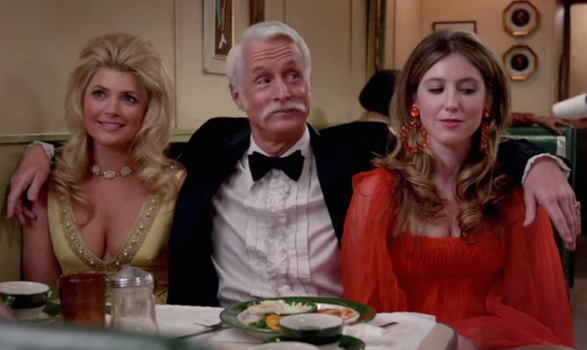Please welcome new member of Team Experience, Lynn Lee (who you may remember from the Reader Spotlight and Furlough Guest Blog) here to continue our unofficial Joan Crawford week - Editor
 Lynn here, filling in for Nathaniel as Mad Men – and with it, Mad Men at the Movies – returns for the final seven episodes. The show has had a good run but from a filmgoing perspective I'm sorry we won't get to see what Don would make of the weird and wonderful cornucopia of movies in the ’70s, from gritty crime sagas to paranoid conspiracy thrillers to, well, “Star Wars.”
Lynn here, filling in for Nathaniel as Mad Men – and with it, Mad Men at the Movies – returns for the final seven episodes. The show has had a good run but from a filmgoing perspective I'm sorry we won't get to see what Don would make of the weird and wonderful cornucopia of movies in the ’70s, from gritty crime sagas to paranoid conspiracy thrillers to, well, “Star Wars.”
Curiously, the only obvious movie reference that popped up in tonight’s episode was to a movie from decades earlier – Mildred Pierce (1945), the half-soap, half-noir blockbuster that revived Joan Crawford’s flagging career and won her the only Oscar of her career. Fittingly, the shout-out comes from Roger Sterling, our most senior character now that Bert Cooper is gone. Even more fittingly, it’s delivered as slightly derisive banter wrapped around an order to an underling: Roger’s in a diner with Don and three ladies, all decked out in evening wear, and he wants the waitress to bring him the bill.

Hey, Mildred Pierce, can I get the check?”
It's not exactly a flattering sobriquet...
In a nutshell, Mildred Pierce, for those who haven't seen either the original film or the the more recent HBO miniseries starring Kate Winslet, is a woman who works herself up from waitress and part-time baker to rich and successful businesswoman, all for the one prize she can't ever win: the love of a horribly selfish daughter who takes everything, is grateful for nothing, and looks down on the humble origins of her mother's money. No wonder the waitress, whose name is actually Diana, seems unimpressed by the reference - or the $100 tip meant to cushion it.
 Elizabeth Reaser guest stars as Mildred stand-in "Diana"Don's impressed, though - by Diana. He thinks they've met before, and while it wouldn't be surprising if he couldn't quite remember, given the Rolodex of lady-friends he's assembled by now, she insists they haven't. Could he be the Monte to her Mildred? He's certainly got the womanizing part down pat. She doesn't seem interested in finding out, though - that alley-shag later is calculated to quash any romantic overtures, not encourage them.
Elizabeth Reaser guest stars as Mildred stand-in "Diana"Don's impressed, though - by Diana. He thinks they've met before, and while it wouldn't be surprising if he couldn't quite remember, given the Rolodex of lady-friends he's assembled by now, she insists they haven't. Could he be the Monte to her Mildred? He's certainly got the womanizing part down pat. She doesn't seem interested in finding out, though - that alley-shag later is calculated to quash any romantic overtures, not encourage them.
His interest in her isn't unwarranted: while not a knockout, there's something about her. Maybe it's that, like some of his past amours (including the one that got away, Rachel), she's an initially standoffish brunette. Maybe it's her demeanor, which seems at once world-weary and just wary. Maybe it's the fact that she's reading the first volume of John Dos Passos' U.S.A. Trilogy. Both Mildred Pierce and the U.S.A. Trilogy hearken back to an earlier time, but they're also both deeply concerned with issues of class and success, and whether you can really engineer a rise in society without compromising your core self. All of which ties in seamlessly with the larger themes of Mad Men - especially at this point in the series, where all of the main characters have attained incredible career success and, at least for some of them, great wealth, and yet are still haunted by the gnawing sense that true happiness will always elude them.

That's not a coincidence. It's a sign of a life not lived!"
Mildred Pierce is also the story of a woman who could have chosen a different path, and yet there's also a sense that it couldn't have been any other way. Likewise, for nearly all the characters in Mad Men, this episode raises the specter of the path not taken - in Ken's (ironic, as it turns out) words, the life not lived - only to have it disappear once again. Don mourns for Rachel and what could have been with her, only to be reminded that there's no guarantee he would have been happy with her. Peggy flirts with the idea of flying to Paris on a first date, only to realize she can't find her passport and, when she does, the charm of the idea has worn off.
 This image is your weekly reminder that Mad Men has yet to win the Costume Design Emmy. For shame.
This image is your weekly reminder that Mad Men has yet to win the Costume Design Emmy. For shame.
Joan, dealt a fresh reminder that too many men see her only as a set of curves, responds by buying beautiful clothes that highlight them - clothes she could never have afforded but for the financial power she acquired in part by selling her body. Pete talks yearningly about California as a promise so vivid at the time, that now just seems like a distant dream. And Ken, handed the perfect opportunity to make his dream a reality and escape the advertising world he loathes, instead chooses to dig deeper into the muck.

Is that all there is?If that's all there is my friends, then let's keep dancing
Let's break out the booze and have a ball
If that's all there is."
What's left to fill the void, to help forget what we lost or never had? Only what money and status can buy: pleasure, perhaps, but no peace, no joy, no love. Of course, it's still too soon to say for sure whether our Mad Men and women are permanently trapped in their prisons of outward success and quiet desperation. But with only six episodes left, time's running out for them to break free. Mildred Pierce could tell them so.